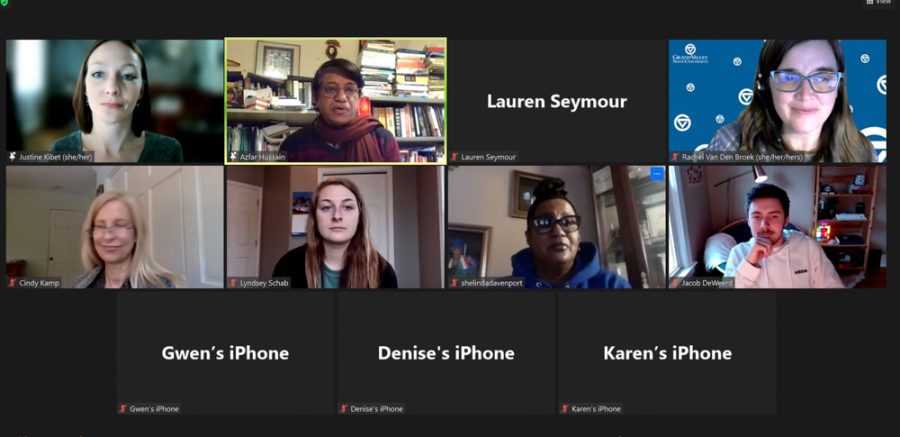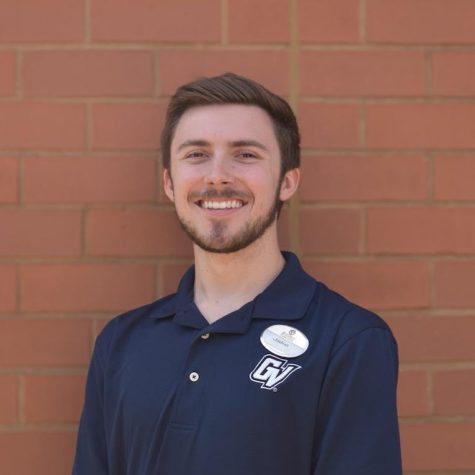IRIS department holds virtual info session for Social Innovation program
GVL / Lauren Seymour
Feb 21, 2022
On Feb. 17, Grand Valley State University’s Integrative, Religious and Intercultural Studies (IRIS) department held a virtual information session dedicated to its Social Innovation (SI) master’s degree program. The meeting, which was facilitated by Graduate Program Director Dr. Azfar Hussain, featured an overview of the program, student testimonials and discussions about what makes the Professional Master of Arts in Social Innovation (PMASI) such a unique degree.
According to the IRIS website, SI is a rapidly-growing professional field focused on careers driven by social impact and cross-sector collaboration. SI-heavy industries include government, nonprofit work, socially-focused entrepreneurship and B Corporations. The PMASI aims to prepare students for work in this emerging field, but the program also focuses on skills that will translate far beyond the workplace.
“Our graduate program provides students with the critical skills needed to work collaboratively with key stakeholders and across sectors to address complex social problems in local, regional and even global organizations and communities,” Hussain said.
Throughout the entire information session, Hussain reiterated the importance of collaboration and consultation in all aspects of the PMASI program. Students enrolled in the program work in more interdisciplinary environments than in most other masters programs and the result is a deeper understanding of how to work with people from different schools of thought. When it comes to solving serious social issues, that skill is invaluable.
“We believe that interdisciplinary training is critical to developing student skills like cross-sector innovation, including responsible conductive research, civic engagement and sustainable community partnerships,” Hussain said.
Because SI is a fairly new field, attendees had questions about what sort of jobs they could expect to look for after completing the PMASI. Hussain was ready for that question and came with data to back up his answer.
“You can get jobs in all kinds of areas, particularly health and human services, nonprofit organizations, municipality government sustainability and urban planning,” Hussain said. “This is just one example. You can become a sustainability consultant making a median salary of over $60,000 according to payscale.com.”
To keep the program as accessible and open to as many students as possible, the prerequisites and curriculum requirements are less intimidating than other master’s programs. There are no course prerequisites required for entry, the minimum GPA requirement is 3.0 for the last 60 hours of undergrad coursework and students can apply to have their own choice of courses count for credit if they’re approved by program administrators. Most classes are offered in a hybrid format to ensure students can attend in whatever format they’re most comfortable with.
“It has worked out just wonderful for me,” said graduate student Shalinda Knight Davenport. “I take two classes every semester and I work part-time in film and TV. So it allows me to do many other things and still learn and be involved in the Social Innovation program.”
When asked about what students’ favorite part of the program typically is, Hussain and Knight Davenport championed the flexibility and excellent collaborative environment within the program. Students work very closely alongside faculty who come to the program with impressive resumes and truly care about their students.
“Our graduate program has quite a set of excellent faculty members who are not only nationally, but also internationally renowned, well-published, well-connected with communities and passionate about supporting their students in this program,” Hussain said.
To end the meeting, Hussain paraphrased an unknown Indian philosopher to urge students to consider the SI program.
“To be socially innovative means to be in love with life,” Hussain said. “You can become innovative only if you love life enough that you want to enhance its beauty, bring a little more music to it, a little more poetry to it, a little more dance to it, and of course justice to it, with compassion, courage, commitment and creativity.”
Students interested in the SI program can find more information at www.gvsu.edu/iris. Questions can be directed to Academic Coordinator Justine Kibet.























